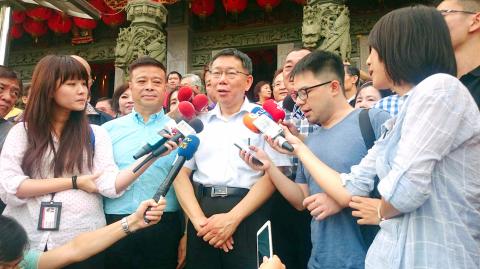Taipei Mayor Ko Wen-je (柯文哲) yesterday said that the so-called “1992 consensus” is a term that lacks substance, and that President Ma Ying-jeou’s (馬英九) trumpeting of the Beijing-backed “one China” principle in Singapore could indicate that he is suffering from “brain damage.”
Ko made the remarks in response to media queries while accompanying People First Party legislative candidate Liu Wen-hsiung (劉文雄) to pray for good fortune at Keelung’s Shengan Temple.
Despite repeatedly saying that he would refrain from criticizing Ma, Ko could not contain his frustration over Ma’s performance at the Singapore summit.

Photo: Yu Chao-fu, Taipei Times
“How could you have asserted the ‘one China’ principle? Have you suffered brain damage?” Ko said, in response to Ma’s statement that the “1992 consensus” is subject to the “one China” principle, while omitting the “different interpretations” component typically stressed by his administration.
The consensus, a term former Mainland Affairs Council chairman Su Chi (蘇起) admitted that he fabricated in 2000, denotes a tacit understanding that there is only one China, with both sides of the Taiwan Strait having their own interpretations of what that means.
As for Ma’s description of the “1992 consensus” as “ambiguous, but capable of solving problems,” Ko said: “As I see it, it is ambiguous, but it has not solved any problems.”
The “1992 consensus” only matters if its premise is addressed in full, as without that it is nothing more than a “title,” Ko said.
Since Xi did not attend the post-summit press conference arranged by Chinese authorities, instead sending Taiwan Affairs Office Minister Zhang Zhijun (張志軍) instead, Ko said that Ma should not have presided over his own press conference, but assigned the task to Zhang’s counterpart, Mainland Affairs Council Minister Andrew Hsia (夏立言).
“If it was up to me, I would have just asked Hsia to hold the press conference,” Ko said.
Beijing’s handling of its press conference has drawn criticism, with many Taiwanese commentators saying that Ma and Xi reneged on their pledges to ensure that Taiwan and China are treated equally and with mutual respect.
Ko hit back at Ma’s apparent swipe during his press conference of the mayor’s “2015 new standpoint” on cross-strait relations, which he proposed at the annual Taipei-Shanghai forum.
Ma said that the “1992 consensus” should serve as the sole reference in cross-strait relations, as it is “unlike red wine, which has a different year [stamped on every bottle].”
“Is he suggesting that he sells different wine each year in the same package?” Ko said.
Asked if he would follow the “model” on cross-strait exchanges Ma created with the “1992 consensus” when meeting Shanghai officials at future forums Ko said: “As I said, it is nothing more than a title. Ma should explain what its content is.”

Taiwan is stepping up plans to create self-sufficient supply chains for combat drones and increase foreign orders from the US to counter China’s numerical superiority, a defense official said on Saturday. Commenting on condition of anonymity, the official said the nation’s armed forces are in agreement with US Admiral Samuel Paparo’s assessment that Taiwan’s military must be prepared to turn the nation’s waters into a “hellscape” for the Chinese People’s Liberation Army (PLA). Paparo, the commander of the US Indo-Pacific Command, reiterated the concept during a Congressional hearing in Washington on Wednesday. He first coined the term in a security conference last

Prosecutors today declined to say who was questioned regarding alleged forgery on petitions to recall Democratic Progressive Party (DPP) legislators, after Chinese-language media earlier reported that members of the Chinese Nationalist Party (KMT) Youth League were brought in for questioning. The Ministry of Justice Investigation Bureau confirmed that two people had been questioned, but did not disclose any further information about the ongoing investigation. KMT Youth League members Lee Hsiao-liang (李孝亮) and Liu Szu-yin (劉思吟) — who are leading the effort to recall DPP caucus chief executive Rosalia Wu (吳思瑤) and Legislator Wu Pei-yi (吳沛憶) — both posted on Facebook saying: “I

Sung Chien-liang (宋建樑), who led efforts to recall Democratic Progressive Party (DPP) Legislator Lee Kun-cheng (李坤城), was released on bail of NT$80,000 today amid outcry over his decision to wear a Nazi armband to questioning the night before. Sung arrived at the New Taipei District Prosecutors’ Office for questioning in a recall petition forgery case last night wearing a red armband bearing a swastika, carrying a copy of Adolf Hitler’s Mein Kampf and giving a Nazi salute. Sung left the building at 1:15am without the armband and covering the book with his coat. Lee said today that this is a serious

A mountain blaze that broke out yesterday morning in Yangmingshan National Park was put out after five hours, following multi agency efforts involving dozens of fire trucks and helicopter water drops. The fire might have been sparked by an air quality sensor operated by the National Center for High-Performance Computing, one of the national-level laboratories under the National Applied Research Laboratories, Yangmingshan National Park Headquarters said. The Taipei City Fire Department said the fire, which broke out at about 11am yesterday near the mountainous Xiaoyoukeng (小油坑) Recreation Area was extinguished at 4:32pm. It had initially dispatched 72 personnel in four command vehicles, 16